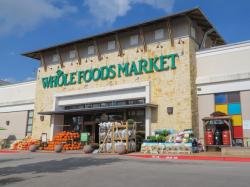Amazon’s Whole Foods Is Starting To Steal Trader Joe’s Shoppers
August 29, 2018 | 1 min to read

When Amazon.com Inc. bought Whole Foods last year, investors panicked and dumped shares in Kroger, Sprouts Farmers Market and even Walmart. The fear was that the e-commerce leviathan would disrupt yet another industry. Since then, the concerns have subsided as investors and analysts came to recognize that it will be years before Amazon becomes a major player in the $800 billion industry. Meanwhile, traditional grocers have more than managed to hold their own.
Still, there are already hints that the fabled Amazon effect is boosting Whole Foods, which had been losing ground to rivals as organic food went mainstream. In more than 100 places around the U.S., the upscale grocer gained foot traffic at the expense of Trader Joe’s, Walgreen and Dollar Tree Stores in the past year, according to Sense360, a Los Angeles company that tracks location data from millions of smartphone users.
The data, which covers Whole Foods locations within one mile of competing stores, demonstrate that Amazon can lure loyal Prime members to physical stores with discounts. Whole Foods just needs a lot more stores to be close to more people. Sense360 Chief Executive Officer Eli Portnoy says national grocers aren’t hurting yet but says Amazon is getting traction at the “micro” level. “We’re at the very beginning stages, and these things take time,” he says. “These findings show there will be an impact.”
To read the rest of the story, please go to: Bloomberg
